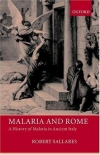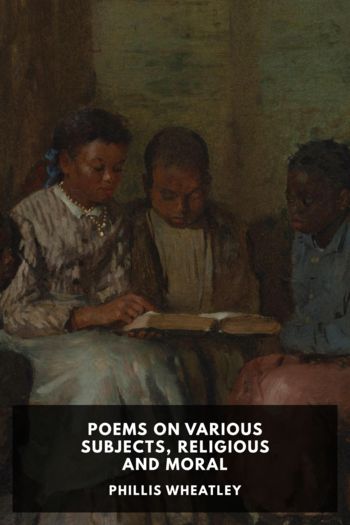Malaria and Rome: A History of Malaria in Ancient Italy, Robert Sallares [reading a book TXT] 📗

- Author: Robert Sallares
Book online «Malaria and Rome: A History of Malaria in Ancient Italy, Robert Sallares [reading a book TXT] 📗». Author Robert Sallares
Garaci, C. (1947). ‘L’andamento dell’infezione estivo-autunnale in Cassino’, Rivista di Malariologia, 23: 283–95.
Garnham, P. C. C. (1966). Malaria parasites and other haemosporidia (Oxford).
Garnsey, P. (1988 a). Famine and food supply in the Graeco-Roman world: responses to risk and crisis (Cambridge).
—— (1988 b). ‘Mountain economies in southern Europe: thoughts on the early history, continuity and individuality of Mediterranean upland pastoralism’, in C. R. Whittaker (ed.) (1988), Pastoral economies in classical antiquity (Cambridge), 196–209.
Garrett-Jones, C. (1962). ‘The possibility of active long-distance migrations by Anopheles pharoensis Theobald’, Bulletin of the World Health Organization, 27: 299–302.
Gaspari, O. (1985). L’emigrazione veneta nell’Agro Pontino durante il periodo fascista (Brescia).
Gaskoin, C. J. B. (1904). Alcuin: his life and work (New York).
Genovese, F. (1924). La malaria in provincia di Reggio Calabria (Florence).
Giacomini, T. and Brumpt, L.-C. (1989). ‘Dissémination passive d’Anophèles par les moyens de transport; la transmission du paludisme (revue historique)’, Revue d’Histoire de la Pharmacie, 36: 163–73.
Gianfrotta, P. A. (1981). ‘Le testimonianze archeologiche del territorio tra Centumcellae e Pyrgi’, in Giardina and Schiavone (eds.) (1981), 407–11.
Giardina, A. and Schiavone, A. (eds.) (1981). Società romana e produzione schiavistica, i. L’Italia: insediamenti e forme economiche (Rome).
Giglioli, G. (1972). ‘Changes in the pattern of mortality following the eradication of hyperendemic malaria from a highly susceptible community’, Bulletin of the World Health Organization, 46: 181–202.
Gilbert, S. C., Plebanski, M., Gupta, S., Morris, J., Cox, M., Aidoo, M., Kwiatkowski, D., Greenwood, B. M., Whittle, H. C., and Hill, A. V. S.
(1998). ‘Association of malaria parasite population structure, HLA, and immunological antagonism’, Science, 279: 1173–7.
Gill, C. A. (1928). The genesis of epidemics and the natural history of disease: an introduction to the science of epidemiology based upon the study of epidemics of malaria, influenza, and plague (London).
—— (1938). The seasonal periodicity of malaria and the mechanism of the epidemic wave (London).
References
303
Gilles, H. M. and Warrell, D. A. (1993). Bruce-Chwatt’s essential malariology, 3rd edn. (London).
Gillespie, J. H. (1991). The causes of molecular evolution (New York).
Ginanni, F. (1774). Istoria civile e naturale delle Pinete Ravennati (Rome).
Ginouvès, R., Guimier-Sorbets, A.-M., Jouanna, J., and Villard, L. (eds.) (1994). L’eau, la santé et la maladie dans le monde grec. Bulletin de Correspondance Héllenique suppl. xxviii (Paris).
Giraudi, C. (1989). ‘Lake levels and climate for the last 30,000 years in the Fucino area (Abruzzo-central Italy): a review’, Palaeogeography, Palaeoclimatology, Palaeoecology, 70: 249–60.
Grandazzi, A. (1997). The foundation of Rome: myth and history, Eng. trans.
(Ithaca, NY).
Grassi, B. (1900). Studi di un zoologo sulla malaria (Rome).
Gravenor, M. B. and Kwiatkowski, D. (1998). ‘An analysis of the temperature effects of fever on the intra-host population dynamics of Plasmodium falciparum’, Parasitology, 117: 97–105.
—— McLean, A. R. and Kwiatkowski, D. (1995). ‘The regulation of malaria parasitaemia: parameter estimates for a population model’, Parasitology, 110: 115–22.
Greene, L. S. (1999). ‘Genetic and dietary adaptation to malaria in human populations’, Parassitologia, 41: 185–92.
Greene, L. S. and Danubio, M. E. (eds.) (1997). Adaptation to malaria: the interaction of biology and culture (Amsterdam).
Greenwood, B. M. (1997). ‘The epidemiology of malaria’, Annals of Tropical Medicine and Parasitology, 91: 763–9.
Greenwood, M. (1921). ‘Galen as an epidemiologist’, Proceedings of the Royal Society of Medicine, 4 (suppl.): 3–16.
Gregorovius, F. (1902). Latian summers and an excursion into Umbria, Eng.
trans. (London).
Grmek, M. D. (1979). ‘Les ruses de guerre biologiques dans l’antiquité’, Revue des Études Grecques, 92: 141–63.
—— (1980). ‘Le concept d’infection dans l’Antiquité et au Moyen Age: les anciennes mesures sociales contre les maladies contagieuses et la fondation de la première quarantine à Dubrovnik (1377)’, Rad Jugo-slavenske Akademije, 384: 9–55.
—— (1983). Les maladies à l’aube de la civilisation occidentale: recherches sur la réalité pathologique dans le monde grec (Paris).
—— (1984). ‘Les vicissitudes des notions d’infection, de contagion et de germe dans la médecine antique’, Mémoires Centre Jean Palerne, 5: 53–70.
—— (1989). Diseases in the ancient Greek world (Baltimore).
—— (1994). ‘La malaria dans la Méditerranée orientale préhistorique et antique’, Parassitologia, 36: 1–6.
—— and Gourevitch, D. (1998). Les maladies dans l’art antique (Paris).
304
References
Guazzi, M. and Grazi, S. (1963). ‘Considerazioni su un caso di malaria quartana recidivante dopo 53 anni di latenza’, Rivista di Malariologia, 42: 55–9.
Guia, A. (1943). ‘Su alcune osservazioni di sintomatologia amenziale in bambini malarici’, Rivista di Malariologia, 22: 20–35.
Gupta, S. et al. (1994). ‘Antigenic diversity and the transmission dynamics of Plasmodium falciparum’, Science, 263: 961–3.
Gupta, S., Snow, R. W., Donnelly, C. A., Marsh, K., and Newbold, C.
(1999). ‘Immunity to non-cerebral severe malaria is acquired after one or two infections’, Nature Medicine, 5: 340–3.
Hackett, L. W. (1937). Malaria in Europe: an ecological study (Oxford).
—— and Missiroli, A. (1931). ‘The natural disappearance of malaria in certain regions of Europe’, American Journal of Hygiene, 13: 57–78.
Hadermann-Misguich, L. (1986). Images de Ninfa: peintures médiévales dans une ville ruinée du Latium ( Quaderni della Fondazione Camillo Caetani VII) (Rome).
Halawani, A. and Shawarby, A. A. (1957). ‘Malaria in Egypt (history, epidemiology, control and treatment)’, Journal of the Egyptian Medical Association, 40: 753–92.
Halevy, S. (1998). ‘Algal inheritance of pathogenic protozoa’, in Green-blatt, C. L. (ed.), Digging for pathogens: ancient emerging diseases: their evolutionary, anthropological and archaeological context (Rehovot), 135–46.
Hall, T. A. (1999). ‘BioEdit: a user-friendly biological sequence alignment editor and analysis program for Windows 95/98/NT’, Nucleic Acids Symposium Series, 41: 95–8.
Hamad, A. A., El Hassan, I. M., El Khalifa, A. A., Ahmed, G. I., Abdelrahim, S. A., Theander, T. G., and Arnot, D. E. (2000). ‘Chronic Plasmodium falciparum infections in an area of low intensity malaria transmission in the Sudan’, Parasitology, 120: 447–56.
Hamblin, M. T. and Di Rienzo, A. (2000). ‘Detection of the signature of





Comments (0)